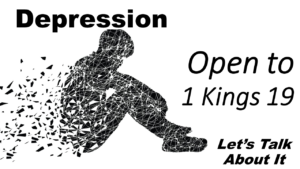
Recommended Reading: Gary Collins – “Christian Counseling”
Elijah is a great case study about Depression – look at these symptoms!
* Suicidal tendencies – “(Elijah) prayed that he might die. ‘I have had enough, LORD,’ he said. ‘Take my life; I am no better than my ancestors.’ 1 Kings 19:4
* Excessive tiredness – “Then he lay down under the tree and fell asleep…” 1 Kings 19:5 slept for a couple of days… maybe longer
* Feelings of rejection – “I have been very zealous for the LORD God Almighty. The Israelites have rejected your covenant, broken down your altars, and put your prophets to death with the sword. I am the only one left, and now they are trying to kill me too.” 1 Kings 19:10
* AND he experienced this depression for a long time – nearly 2 months
(1 Kings 19:5-6) an angel touched him and said to him, “Arise and eat.” 6 And he looked, and behold, there was at his head a cake baked on hot stones and a jar of water. And he ate and drank and lay down again.
In 1999 Duke University conducted a study of nearly 4000 older adults. One of their conclusions: “Attendance at a house of worship is related to lower rates of depression and anxiety.”
https://www.sciencedaily.com/releases/1999/07/990726070153.htm
Andrew Newberg, director of clinical nuclear medicine at the University of Pittsburgh used the SPECT technique and made an interesting discovery. Newberg studied the brains of religious individuals who either prayed or meditated. And his team found a dramatic increase in action in the front region of the brain called the pre-frontal cortex. The region is associated with judgment and empathy. The group also discovered decreased activity in a region of the brain known as the superior parietal lobe, which gives us our sense of “self.” The findings seem to indicate that people – while engaged in spiritual pursuits – felt a loss of self. Newberg says prayer and meditation have been shown to lower the risk of depression and heart disease and improve immune function.
http://www.andrewnewberg.com/research
JEWSIH HOPE – When our allied troops were making their way across Cologne Germany to cross Hitler’s forces, they came across a bombed out concentration camp building that had this inscription scrawled on a basement wall:
“I believe in the sun even when it’s not shining.
I believe in love even when it is not shown.
And I believe in God even He doesn’t speak.”
Dr. Karl Menninger replied, “Lock up your house, go across the railroad tracks, find somebody in need, and help that person.” To overcome discouragement, “Don’t focus on yourself, get involved in the lives of other people.”
https://greatergood.berkeley.edu/article/item/the_birthday_of_karl_menninger
- Give them rest
- Find Church
- Let them talk
- Deal with false beliefs – Give Hope
- Give them a mission
The Bible gives us an amazing glimpse into the soul of Jesus the night before he was crucified. Watch and learn from the way Jesus fought his strategic battle against despondency or depression.
- He chose some close friends to be with him. “Taking with him Peter and the two sons of Zebedee” (Matthew 26:37).
- He opened his soul to them. He said to them, “My soul is very sorrowful, even to death” (Matthew 26:38).
- He asked for their intercession and partnership in the battle. “Remain here, and watch with me” (Matthew 26:38).
- He poured out his heart to his Father in prayer. “My Father, if it be possible, let this cup pass from me” (Matthew 26:39).
- He rested his soul in the sovereign wisdom of God. “Nevertheless, not as I will, but as you will” (Matthew 26:39).
- He fixed his eye on the glorious future grace that awaited him on the other side of the cross. “For the joy that was set before him [he] endured the cross, despising the shame, and is seated at the right hand of the throne of God” (Hebrews 12:2).
